Related Research Articles

Disco is a genre of dance music and a subculture that emerged in the 1970s from the United States' urban nightlife scene. Its sound is typified by four-on-the-floor beats, syncopated basslines, string sections, brass and horns, electric piano, synthesizers, and electric rhythm guitars.
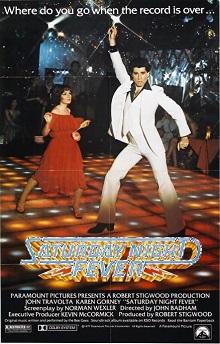
Saturday Night Fever is a 1977 American dance drama film directed by John Badham and produced by Robert Stigwood. It stars John Travolta as Tony Manero, a young Italian-American man who spends his weekends dancing and drinking at a local discothèque while dealing with social tensions and disillusionment in his working class ethnic neighborhood in Brooklyn. The story is based on "Tribal Rites of the New Saturday Night", a mostly fictional 1976 article by music writer Nik Cohn.
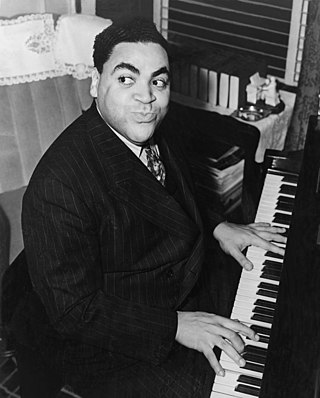
Thomas Wright "Fats" Waller was an American jazz pianist, organist, composer, and singer. His innovations in the Harlem stride style laid much of the basis for modern jazz piano. A widely popular star in the jazz and swing eras, he toured internationally, achieving critical and commercial success in the United States and Europe. His best-known compositions, "Ain't Misbehavin'" and "Honeysuckle Rose", were inducted into the Grammy Hall of Fame in 1984 and 1999.

Decca Records is a British record label established in 1929 by Edward Lewis. Its US label was established in late 1934 by Lewis, Jack Kapp and Milton Rackmil, who later became American Decca's president too. In 1937, anticipating Nazi aggression leading to World War II, Lewis sold American Decca, and the link between the UK and US Decca label was broken for several decades. The British label was renowned for its development of recording methods, while the American company developed the concept of cast albums in the musical genre.

The Bee Gees were a musical group formed in 1958 by brothers Barry, Robin, and Maurice Gibb. The trio were especially successful in popular music in the late 1960s and early 1970s, and later as prominent performers in the disco music era in the mid-to-late 1970s.
The 21st Annual Grammy Awards were held in 1979, and were broadcast live on American television. They recognized accomplishments by musicians from the year 1978.

Saturday Night Fever is the soundtrack album from the 1977 film Saturday Night Fever starring John Travolta. The soundtrack was released on November 15, 1977 by RSO Records. Prior to the release of Thriller by Michael Jackson, Saturday Night Fever was the best-selling album in music history, and still ranks among the best-selling soundtrack albums worldwide, with sales figures of over 40 million copies.
PolyGram N.V. was a multinational entertainment company and major music record label formerly based in the Netherlands. It was founded in 1962 as the Grammophon-Philips Group by Dutch corporation Philips and German corporation Siemens, to be a holding for their record companies, and was renamed "PolyGram" in 1972. The name was chosen to reflect the Siemens interest Polydor Records and the Philips interest Phonogram Records. The company traced its origins through Deutsche Grammophon back to the inventor of the flat disc gramophone, Emil Berliner.
Sound design is the art and practice of creating soundtracks for a variety of needs. It involves specifying, acquiring or creating auditory elements using audio production techniques and tools. It is employed in a variety of disciplines including filmmaking, television production, video game development, theatre, sound recording and reproduction, live performance, sound art, post-production, radio, new media and musical instrument development. Sound design commonly involves performing and editing of previously composed or recorded audio, such as sound effects and dialogue for the purposes of the medium, but it can also involve creating sounds from scratch through synthesizers. A sound designer is one who practices sound design.

Robert Colin Stigwood was an Australian-born British-resident music entrepreneur, film producer and impresario, best known for managing Cream, Andy Gibb and the Bee Gees, theatrical productions like Hair and Jesus Christ Superstar, and film productions including the successful Grease and Saturday Night Fever. On his death, one obituary judged that he had been for a time the most powerful tycoon in the entertainment industry: "Stigwood owned the record label that issued his artists’ albums and film soundtracks, and he also controlled publishing rights – not since Hollywood's golden days had so much power and wealth been concentrated in the hands of one mogul."
Frederick James Perren was an American songwriter, record producer, arranger, and orchestra conductor. He co-wrote and co-produced songs including "Boogie Fever" by the Sylvers, "I Will Survive" by Gloria Gaynor, and "Shake Your Groove Thing" by Peaches & Herb.
Randy Edelman is an American musician, producer, and composer for film and television. He began his career as a member of Broadway's pit orchestras; he later produced solo albums for songs that were picked up by leading music performers including The Carpenters, Barry Manilow, and Dionne Warwick. He is known for his work in comedy films. He has been awarded many prestigious awards along with two nominations for a Golden Globe Award, a BAFTA Award, and twelve BMI Awards. Edelman was given an honorary doctorate in fine arts by the University of Cincinnati in 2004.
Walter Anthony Murphy Jr. is an American composer, keyboardist, songwriter, and record producer. He is best known for the instrumental "A Fifth of Beethoven", a disco adaptation of Beethoven's Fifth Symphony which topped the charts in 1976 and was featured on the Saturday Night Fever soundtrack in 1977. Further classical-disco fusions followed, such as "Flight '76", "Toccata and Funk in 'D' Minor" "Bolero", and "Mostly Mozart", but were not as successful.

"Night Fever" is a song written and performed by the Bee Gees. It first appeared on the soundtrack to Saturday Night Fever on RSO Records. Producer Robert Stigwood wanted to call the film Saturday Night, but singer Robin Gibb expressed hesitation at the title. Stigwood liked the title Night Fever but was wary of marketing a movie with that name. The song bounded up the Billboard charts while the Bee Gees’ two previous hits from Saturday Night Fever soundtrack were still in the top ten. The record debuted on the Billboard Hot 100 Chart at #76, then leaped up 44 positions to #32. It then moved: 32–17–8–5–2–1. It remained at #1 for eight weeks, and ultimately spent 13 weeks in the top 10. For the first five weeks that "Night Fever" was at #1, "Stayin' Alive" was at #2. Also, for one week in March, Bee Gees related songs held five of the top positions on the Hot 100 chart, and four of the top five positions, with "Night Fever" at the top of the list. The B-side of "Night Fever" was a live version of "Down the Road" taken from the Bee Gees 1977 album, Here at Last... Bee Gees... Live.
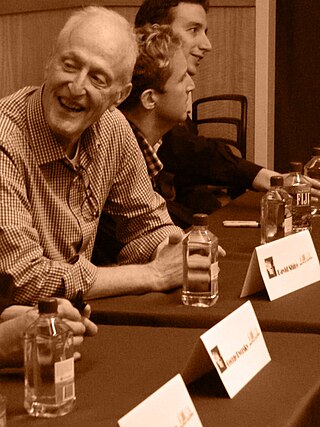
David Lee Shire is an American songwriter and composer of stage musicals, film and television scores. Among his best known works are the motion picture soundtracks to The Big Bus, The Taking of Pelham One Two Three, The Conversation, All the President's Men, and parts of the Saturday Night Fever soundtrack such as "Manhattan Skyline". His other work includes the score of the 1985 film Return to Oz, and the stage musical scores of Baby, Big, Closer Than Ever, and Starting Here, Starting Now. Shire is married to actress Didi Conn.
A soundtrack album is any album that incorporates music directly recorded from the soundtrack of a particular feature film or television show. The first such album to be commercially released was Walt Disney's Snow White and the Seven Dwarfs, the soundtrack to the film of the same name, in 1938. The first soundtrack album of a film's orchestral score was that for Alexander Korda's 1942 film Rudyard Kipling's Jungle Book, composed by Miklós Rózsa.
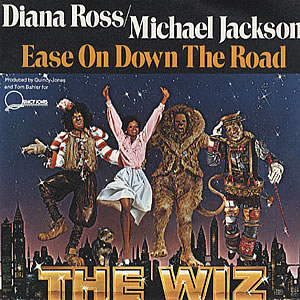
"Ease on Down the Road" is a song from the 1975 Broadway musical The Wiz, an R&B re-interpretation of L. Frank Baum's The Wonderful Wizard of Oz. The Charlie Smalls–composed tune is the show's version of both "Follow the Yellow Brick Road" and "We're Off to See the Wizard" from the 1939 version of The Wizard of Oz. In the song, performed three times during the show, Dorothy and her friends the Scarecrow, the Tin Man, and the Cowardly Lion dance their way down the Yellow Brick Road and give each other words of encouragement.
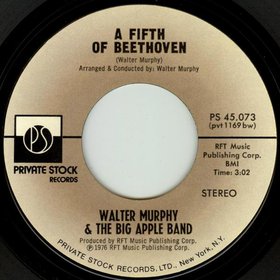
"A Fifth of Beethoven" is a disco instrumental recorded by Walter Murphy and the Big Apple Band, adapted from the first movement of Ludwig van Beethoven's Symphony No. 5. The record was produced by production music and sound effects recording producer Thomas J. Valentino. The "Fifth" in the song's title is a pun, referencing a liquid measure approximately equal to one-fifth of a gallon, a popular size for bottles containing liquor, as well as Beethoven's Fifth Symphony from which the song was adapted.

Paul Frederick Jabara, was an American actor, singer, and songwriter. He was born to a Lebanese family in Brooklyn, New York. He wrote Donna Summer's Oscar-winning "Last Dance" from Thank God It's Friday (1978), as well as "No More Tears ", Summer's international hit duet with Barbra Streisand. He also co-wrote the Weather Girls' iconic hit "It's Raining Men" with Paul Shaffer.
"If I Can't Have You" is a disco song written by the Bee Gees in 1977. The song initially appeared on the Saturday Night Fever soundtrack in a version by Yvonne Elliman, released in November 1977. The Bee Gees' own version appeared a month later as the B-side of "Stayin' Alive".
References
- ↑ Thomas J Valentino Is Dead, Early Sound-effects Producer New York Times Aug 8, 1986